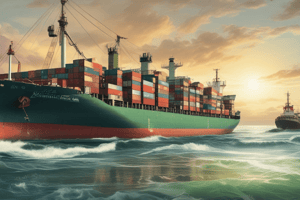Podcast
Questions and Answers
The spending power of UK citizens has increased when buying Irish exports.
The spending power of UK citizens has increased when buying Irish exports.
False (B)
Ireland's low corporation tax is one factor that has attracted multinational companies.
Ireland's low corporation tax is one factor that has attracted multinational companies.
True (A)
If MNCs relocate from Ireland, it would increase Irish exports.
If MNCs relocate from Ireland, it would increase Irish exports.
False (B)
Tariffs imposed on exports to the United Kingdom will make Irish goods cheaper for UK consumers.
Tariffs imposed on exports to the United Kingdom will make Irish goods cheaper for UK consumers.
Emerging markets such as China and India present both opportunities and competition for Irish exporters.
Emerging markets such as China and India present both opportunities and competition for Irish exporters.
Eastern European countries tend to have higher wage rates than Irish exporters.
Eastern European countries tend to have higher wage rates than Irish exporters.
Technological advancements have made it more difficult for Irish firms to market internationally.
Technological advancements have made it more difficult for Irish firms to market internationally.
Employees in Ireland can now work from anywhere in the world due to technology.
Employees in Ireland can now work from anywhere in the world due to technology.
The agri-food sector in Ireland is expected to benefit from the introduction of trade barriers.
The agri-food sector in Ireland is expected to benefit from the introduction of trade barriers.
E-commerce has enabled Irish businesses to advertise only locally.
E-commerce has enabled Irish businesses to advertise only locally.
Flashcards are hidden until you start studying
Study Notes
International Trade
- Involves the importing and exporting of goods and services between countries.
Open Economy
- An economy that actively participates in international trade activities.
- Ireland is categorized as a small open economy reliant on trade with other nations.
- Approximately 80% of Ireland's goods are exported due to a limited domestic market.
Benefits of Irish International Trade
- Economies of Scale: Large-scale production allows Irish companies, like Kerry Group, to lower costs and compete internationally.
- Access to Larger Markets: Reduces dependence on Ireland's 5 million population by tapping into the EU's over 500 million consumers.
- Increased Efficiency: Competition from trading encourages businesses to improve efficiency, leading to lower prices for consumers.
- Green Image: Ireland's environmentally friendly reputation benefits its tourism and food sectors.
- Advancements in IT: Global communication improvements facilitate marketing and distribution for Irish businesses.
- Language Advantage: English being the primary language of trade provides Ireland with a competitive edge in international business.
- Emerging Markets: Places like China offer expanded opportunities for Irish exporters, particularly in food and drink sectors.
- Variety: Access to diverse raw materials and services enhances offerings available to both Irish businesses and consumers.
Challenges for Irish International Trade
- High Cost Base: Elevated costs for raw materials, labor, and insurance hinder price competitiveness.
- Distribution Costs: Ireland's geographic location increases export distribution costs, affecting competitiveness.
- Intense Competition: Global companies pose a challenge; Irish firms must innovate through R&D for unique offerings.
- Language Barriers: Marketing internationally may necessitate fluency in various languages, complicating promotional efforts.
- Exchange Rate Fluctuations: Variations in the Euro’s value can raise prices for exports and imported materials, affecting profits.
- Payment Difficulties: Different legal systems can complicate the enforcement of payment for exports.
- Customs Duties: Exports to non-EU countries incur customs duties, making them less competitive abroad.
- Cultural Differences: Understanding local customs and cultures is essential for effective marketing in international markets.
Protectionism
- Protects domestic industries through trade barriers, aimed at preserving jobs and improving the balance of payments.
- Trade barriers can be political or health-related, primarily to shield home industries from foreign competition.
Exports
- Defined as the sale of Irish goods and services to foreign buyers, contributing to foreign currency income.
- Exports can be categorized as visible (physical goods) or invisible (services).
Reasons for Exporting
- Foreign Currency: Necessary for importing goods.
- Market Access: Expanding beyond Ireland's small population into larger markets like China.
- Diversification: Mitigating risks associated with dependability on the domestic market.
- Business Expansion: Growth beyond the domestic market is essential for job creation and profitability.
- Economies of Scale: Increased production can lower costs and enhance competitiveness globally.
Opportunities for Irish Exporters
- Technological Improvements: Facilitate instant global communication and online marketing.
- Emerging Markets: Growing economies like China and Japan present opportunities for Irish products.
- World Trade Organization (WTO): Promotes global trade and the reduction of trade barriers.
- Reduced Risks: Diversification through new market entry lowers business risks and enhances competitiveness.
- Green Image: Ireland's natural image as a pollution-free country is a key marketing asset.
Challenges for Irish Exporters
- Globalization: Higher production costs compared to global competitors necessitate efficiencies and R&D investment to maintain unique products.
- Currency Fluctuations: Strengthening Euro can make Irish goods costlier in international markets, risking decreased sales.
- International Differences: Cultural and language expertise is vital for successful marketing and product adaptation in foreign markets.
Measuring International Trade
- Balance of Trade (BOT): Represents the difference between visible exports and imports, indicating surplus or deficit.
- Balance of Invisible Trade (BOIT): Measures services traded, with surplus or deficit determined by invisible exports and imports.
- Balance of Payments (BOP): Accounts for total money entering and leaving a country through exports and imports, revealing overall trade health.
International Economy Effects on Ireland
- Currency Fluctuations: A weaker Sterling reduces UK purchasing power for Irish goods, negatively affecting exports.
- MNC Influence: Major multinationals bring exports to Ireland; changes in their operational costs can impact export levels.
- Increased Protectionism: Trade barriers from countries like the UK threaten Irish export sales, especially in agriculture.
- Emerging Markets: Growing nations provide opportunities but introduce competition for Irish industries.
- New EU Member States: Lower production costs in Eastern Europe may challenge Irish exporters.
- Technology Advances: Enhanced communication and e-commerce facilitate global marketing and operational efficiencies.
Studying That Suits You
Use AI to generate personalized quizzes and flashcards to suit your learning preferences.




